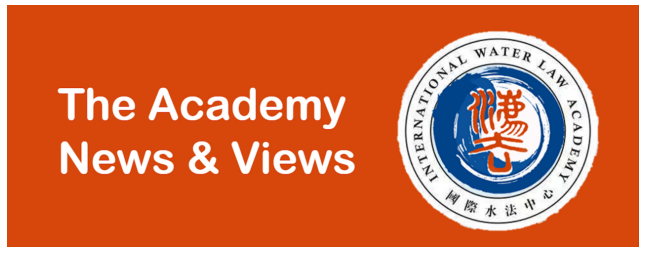
Director’s Message
Welcome to the latest News & Views from our Academy. This issue focuses on sharing Affiliates updates – with a warm welcome to our newest Affiliates from all around the globe! We also feature an interview with Dr. Ana Maria Daza-Clark from the University of Edinburgh, with insights into her work on legal frameworks for trade and investment law in the field of transboundary water – a hugely under-studied area of water law.
2023 is shaping up to be a very busy year for the Academy. After the 2023 UN Conference in New York – where so many of our Academy Affiliates participated – the Academy now follows up on our commitment to the Water Action Agenda in a 3-pronged approach to promote the effective implementation of international water law:
1. Contribute and continue to develop its expertise in water law to support enhanced transboundary water cooperation in line with the SDGs.
2. Support ongoing capacity development in water law around the globe.
3. Develop the next generation of local water leaders, experts in water law, through scholarship, exchange of information, mentorship and state practice.
Aligned with the UN SDG 6 commitments, the Academy forges ahead on all fronts. Academy Affiliates are engaged to present their work at a number of forthcoming international meetings, including, most notably the first international water law conference in Wuhan scheduled for mid-September 2023. We are delighted to announce the forthcoming Special Issue of the Journal of Water Law, dedicated to a collection of scholarship by our Emerging Scholars (watch this space!).
Welcome to our newest Academy Affiliates and warm greetings and
gratitude to our existing Affiliates – what a fantastic team!
Affiliates – share your news with us for future issues of our Substack News & View, simply email us at Daniel.IWLA@proton.me
Affiliate Spotlight

Dr. Ana Maria Daza-Clark, University of Edinburgh Law School
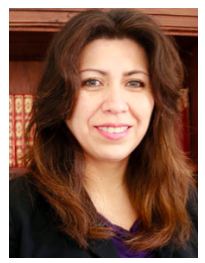
Dr. Ana María Daza-Clark is a Lecturer in International Law at the University of Edinburgh, Law School, and an Affiliate member of IWLA. Her research and teaching focuses on International Economic Law, International Investment Law and Arbitration, WTO Law, International Water Law, and Management of Natural Resources. She is Programme Director of the International Economic Law LL.M at the University of Edinburgh, and provides expert advice to governments, foreign investors and international organisations.
Q1. How does your recent published research on international investment law feed through into IWL and better inform that body of law with respect to the financial implications of different IWL deliberations and outcomes?
For the last 13 years my research has focused on the relationship between the legal frameworks protecting international investment and trade and its intersection with other areas of law. Chief among them is IWL and water resources management. In trying to address the financial implications connected to transboundary and national water resources, my research endeavours to understand the economic value of water and what considerations are appropriate to determine it, at different points in time, in different regions, and different users. In my monography ‘International Investment Law and Water Resources Management: An Appraisal of Indirect Expropriation’, I explored the unique nature of water resources and explain why water is special given its particular characteristics. One of my findings suggests the social, environmental, and economic value of water resources is neither embedded in concessional water rights given to investors, nor it is adequately accounted within the investment’s overall value. However, the real value of water becomes clear when those concessional rights are affected, and the investor no longer has access to water resources; this is because water has no possible substitutes.
I believe such considerations are relevant in the context of recognising water as global commons. I have therefore resumed this topic in light of recent debates at the United Nations 2023 Water Conference and other meetings. In addition, to this conceptual work, I continue to investigate these intersections, i.e., potential conflicts and mutual supportiveness between international investment law and water resources management. This includes the dispute settlement mechanisms which play a preponderant role within the framework of water resources management, transboundary or not, and within the framework of foreign investment protection.
Q2. What was the IWL significance of the recent hydropower conference in Bologna, with fellow IWLA Affiliate Dr. Owen McIntyre and others, that you helped make such a success?
The topic of the conference, International Law and Transboundary Hydropower Projects showed the important role of the IWL framework in the use of transboundary hydropower initiatives. Academic and non-academic participants alike, resorted to the principles and rules of IWL when sharing experiences linked to hydropower projects and their relationship with human rights, environmental protection, local and indigenous communities and financial arrangements. It is clear that both, IWL substantive and procedural rules play an influential role in the implementation of regional arrangements. The role of science cannot be understated in this discussion; it calls for a truly interdisciplinary exchange between different fields of knowledge.
Q3. How does your work contribute to driving forward the global Water Action Agenda, as committed to by the IWLA and others last month at the UN in New York?
Addressing the challenges around water scarcity, hydrological variability due to climate change and energy transition from fossil fuels to green energy will require a great deal of national and foreign investment. However, this time around the conditions for investment are far from predictable or 100 per cent stable; new technology, infrastructure and markets will need to be tested in real time. This could deter investment initially, my research seeks to identify frameworks that allow policy makers reasonable regulatory adaptability, while providing investors with adequate protection and incentives to become resilient to potential market failures. The problem of political risks, however, may require further engagement with communities and consideration of their social, cultural and economic needs.
Welcome to our new Global Affiliates!
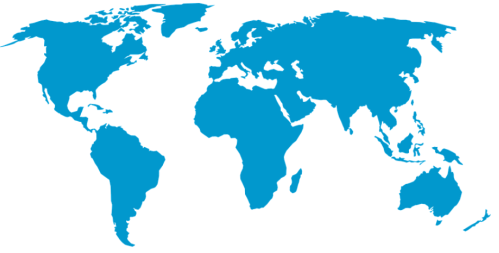
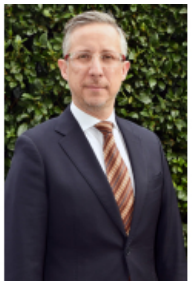
Dr. Michael Hantke-Domas is Associate Professor in the Faculty of Law and Government at San Sebastián University (Chile), Vice Chair of the Water and Wetland Law Specialist Group at the International Union for the Conservation of Nature (IUCN) World Commission on Environmental Law, and an affiliate member of the IWLA.
Dr. Michael Hantke-Domas is an internationally recognized lawyer for his professional and academic practice in water law, environmental law, and natural resources. He has more than 25 years of experience acting as a judge, academic, lawyer, public servant, international official, and consultant. He served as Justice of the Third Environment Court (Valdivia, Chile) for 6 years (2013-2019) and as its first President he led the Court’s operational establishment. Created by Act N°20.600 of 2012 this new court provides all Chilean citizens access to judicial review of administrative resolutions and decisions regarding environmental legal disputes.
Previously, Dr. Hantke-Domas worked in two large law firms in Chile and acted as legal advisor for the Ministry of Public Works (Chile) and the Chilean Water Services Regulation Authority. He is also a member of the International Association for Water Law, the European Environmental Law Forum, the Chilean Association of Environmental Law, and honorary member of the Mexican Academy of Law, Juan Velázquez A.C.
In addition, he works as a lawyer and senior international consultant, for instance providing consultancy to the IUCN, The Nature Conservancy, and the Environmental Law Institute, among others, and is fluent in English and Spanish.
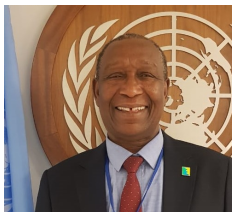
Eng. Sylvester A. Matemu, from Tanzania, is an expert in both International and National Water Law. His work encompasses transboundary water agreements, the supervision, preparation and execution of transboundary water resources management and development plans and ensuring the mainstreaming of adopted international water programmes and strategies in-country. He has worked for 40 years in the public sector, including 29 years in the Water Sector and 11 years in, variously, the Education, Energy, Minerals and Communication Sectors. He has served as Chairman of various Technical Advisory Committees both domestically and internationally, on the Boards of various water-related institutions, and as an advisor to Ministers responsible for Water, Higher Education, Communication, Science and Technology.
Mr. Matemu was endorsed by all Nile Basin Countries to become an Executive Director of the Secretariat of the Nile Basin Initiative, based in Entebbe, Uganda in 2021. He is also the President of the African Network for Basin Organizations (ANBO).
Some of the key regional and international institutions that he has provided expert support to include:
· United Nations Economic Commission for Europe
· Southern Africa Development Community
· African Ministers Council
· Nile Basin Initiative (NBI)
· Lake Victoria Basin Commission
· Zambezi Watercourse Commission
· Songwe River Basin Commission
· Lake Tanganyika Authority
· Global Water Partnership
· Joint Water Commission of Ruvuma River Basin
Finally, Mr. Matemu supported the International Water Law ‘Water-Net’ programme delivered to master’s degree students studying Integrated Water Resources Management modules at the University of Dar es Salaam, Tanzania.

Dr. Tamar Meshel is an Associate Professor at the University of Alberta Faculty of Law in Canada, and an Affiliate member of IWLA. Dr Meshel researches, teaches, and consults in the areas of domestic and international arbitration, international water law, and transboundary freshwater dispute resolution. She has authored more than 40 publications in these fields. She completed her doctorate at the University of Toronto Faculty of Law, focusing on international watercourses law from a dispute resolution perspective. Prof. Meshel is a board member of the Canadian Council on International Law and has been a guest lecturer at the International Tribunal for the Law of the Sea Nippon Program.
Previously, she worked as an international dispute resolution lawyer in Vancouver, Canada, as Deputy Counsel at the International Court of Arbitration in Paris, France, and as legal advisor to the Jerusalem Arbitration Center in Israel and Palestine. She was also a Research Fellow with the Max Planck Institute for International, European and Regulatory Procedural Law in Luxembourg, and a Schulich Fellow at the Schulich School of Law at Dalhousie University in Halifax, Canada.
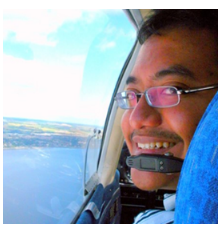
Dr. Mohamad Mova Al’Afghani is an affiliate member of IWLA and Lecturer on Environmental Law at Universitas Ibn Khaldun Bogor, Indonesia. Dr. Al’Afghani had worked as an expert consultant with the following organisations:
· United Nations Industrial Development Organization, on phasing out persistent organic pollutants.
· World Health Organisation, on the drinking water quality and water safety plan.
· United Nations Development Programme, on a project to phase-out mercury, as well as with UNDP’s Business and Human Rights Asia program for Human Rights and Environmental Due Diligence.
· World Bank, for a study on water security in Indonesia on the provision of drinking water to urban poor population.
· Food and Agricultural Organization, on a study on water tenure.
· Department of Foreign Affairs and Trade, Australia, providing a study on local sanitation provision.
· Center for Regulation, Policy and Governance (CRPG) based in Bogor, Indonesia. The CRPG has conducted several research projects where he acted as the Principal Investigator/team leader, a list of these projects can be found on his bio on the IWLA website.
Dr. Al’Afghani was involved in the drafting of Indonesia’s new Water Law 17/2019. He is frequently consulted by the Indonesian Ministry of Planning, the Ministry of Environment and Forestry, as well as the Ministry of Health on various water and environmental issues. His regional and international engagement includes in reviewing the work of the Association of Southeast Asian Nations Working Group on Water Resources Management on the human right to water (as an expert representing the Raoul Wallenberg Institute), Member of Advisory Committee, Water and Open Government and collaboration with the Sanitation and Water for All initiative. As a member of IWLA, Dr. Al’Afghani is involved in research on national water law, both on water services (utilities regulation, rural water supply, sanitation and hygiene) and water resources (allocation frameworks, pollution control, flood risk mitigation and the human right to water).
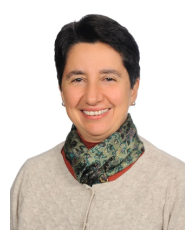
Prof. Dr. Aysegül Kibaroglu is the Chair of the Department of Political Science and International Relations at MEF University in Istanbul. She teaches courses on public international law, international organizations, and water politics to undergraduate and graduate students. She was a Visiting Professor at the University of Texas at Austin, LBJ School of Public Affairs in 2016. She was a Faculty Member and the Vice Chair of the Department of International Relations at Middle East Technical University in Ankara from 2003-2011.
Prof. Kibaroglu regularly delivers conferences and seminars to diplomats, legal advisers, and government officials – both in Türkiye and abroad. She worked as the Advisor to the President of the South-eastern Anatolia Project Regional Development Administration from 2001 to 2003. She has acted as the co-founder of an informal water diplomacy initiative, namely the Euphrates-Tigris Initiative for Cooperation, together with her colleagues from Syria, Iraq, and Türkiye.
She has participated in a wide range of international research projects, such as “Cooperation on Türkiye’s Transboundary Waters” led by the Berlin Technical University, Adelphi, German Federal Ministry for Environment, Nature Conservation and Nuclear Safety, and the German Development Institute-DIE (2004-2011); “Water Law and Cooperation in the Euphrates-Tigris Region: A Comparative and Interdisciplinary Approach” led by the Max Planck Foundation for International Peace and the Rule of Law, in Heidelberg (2011-2013). She also participated in the project “Sustainability of Engineered Rivers in Arid Lands: Outlook to 2060,” led by the University of Texas at Austin, (2013-2021). Prof. Kibaroglu acts as the Consultant for the European Union (EU)-funded Horizon2020 project “CASCADES: Helping European Societies Address Cascading Climate Risks from outside Europe” led by the Potsdam Institute for Climate Impact Research, Wirtschaftsuniversität Wien (2019-2023).
Prof. Kibaroglu has published extensively on the politics of water resources with an emphasis on the Euphrates Tigris River basin, a list of her publications can be found on our website.

Dr. Alexander López is a Professor at the National University of Costa Rica and Latin American Consultant for the Convention on the Protection and Use of Transboundary Watercourses and International Lakes. He is the former director of the “Central American Institute for Public Administration”, a regional international organization. He is also the former director of the Institute for International Affairs at the Universidad Nacional of Costa Rica. He has worked in several countries including Norway, Vietnam, South Africa, India, Brazil, México and throughout Central America on issues related to international environmental policies (water management and climate change). Dr López has given lectures and seminars in more than 40 countries around the world and has published extensively in Spanish and English with well-known publishers such as SAGE, the Massachusetts Institute of Technology Press, Routledge, and Kluwer Academic Publishers.
Dr. López has been consultant for several institutions such as the World Meteorological Organization, the United Nations Environmental Program, and the EU among others. He has attended many international conferences in the context of his work.
More information on our affiliates can be found on the IWLA website, including their publications.
Going Forward – Meetings in 2023

Looking forward – the Academy will be busy – here are some of the meetings we will be participating in:
20th Annual Colloquium of the IUCN Academy of Environmental Law
31 July – 4 August 2023, University of Eastern Finland (UEF) Joensuu, Finland and online.
IWLA will participate in 2 panel sessions; Future-Proofing International Water Law and International Water Law’s Contribution to Achieving the Sustainable Development Goals, in line with this year’s theme: ‘Future Proofing Law in a Time of Environmental Emergency’. Prof. Patricia Wouters, Prof. Owen McIntyre, Prof. Alistair Rieu-Clarke and Dr. David Devlaeminck will attend along with other affiliates and the Academy’s Emerging Scholars Initiative. Learn more: https://sites.uef.fi/iucn-ael-2023/
World Water Week 2023
20-24 August 2023, Stockholm Sweden
The Academy will attend the World Water Week in Stockholm. The World Water Week provides an opportunity to help advance the commitments for the World Action Agenda, which will be made at the UN 2023 Water Conference in New York in March. This year’s theme is ‘Seeds of Change: Innovative Solutions for a Water-Wise World.’ Learn more: https://www.worldwaterweek.org
International Water Resources Association, (IWRA) World Water Congress
September 11-15, 2023, Beijing, China
Hosted by the International Water Resources Association and the Ministry of Water Resources of the P.R. China, this year’s theme is: “Water for All: Harmony between Humans and Nature”. The Congress will facilitate knowledge and experience sharing, focusing on investigating the relationship between water, humans and nature and developing and implementing water management strategies and polices using systematic approaches. The Academy will convene two Special Sessions in Beijing, focusing on transboundary water law. Learn more: https://www.worldwatercongress.com
IWLA Wuhan Conference
September 15-16, 2023 – International Water Law Academy, Wuhan University, China
IWLA is hosting a hybrid international conference in Wuhan aimed at drawing together forward-looking thinking on the hard issues in transboundary water law. Building on the Academy’s ongoing Charting a Path Initiative (CAPI), its four Research Interest Areas and the Emerging Scholars Initiative, the session will catalyse scholarship to be featured in a forthcoming Special Issue.

The next newsletter will be published in June 2023
Communications Team
Dale Campbell, Daniel Gilbert, Tian Yunhe
![]() Tel: 86-027-68756726
Tel: 86-027-68756726
![]() Address: Wuhan University China Institute of Boundary and Ocean Studies (CIBOS), P.R. China,
Address: Wuhan University China Institute of Boundary and Ocean Studies (CIBOS), P.R. China,
© International Water Law Academy. All Rights Reserved.